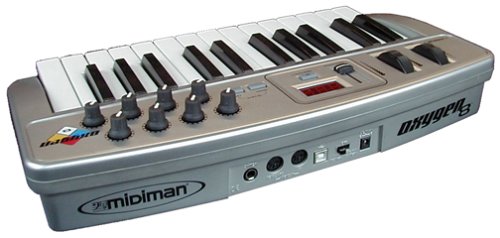 Buy M-Audio Oxygen 8 25 Key Midi Keyboard Controller
Buy M-Audio Oxygen 8 25 Key Midi Keyboard ControllerM-Audio Oxygen 8 25 Key Midi Keyboard Controller Product Description:
- Control the parameters of any soft synth
- This software takes you deeper into the capabilities of your music
- It also gives you greater freedom when you're on stage
- Program your drums in real-time
- Input & output for up to 16 different MIDI channels
Product Description
The portable soft synth controller for today's electronic musicians!
Customer Reviews
Most helpful customer reviews
19 of 20 people found the following review helpful.![]() A good first keyboard
A good first keyboard
By jd
I too am a guitar player and I bought this guy about 2 years ago to use with Sonar. I didn't plan on becoming a keyboard player, but I have, and I can thank this little guy for that. It is wonderfully non-intimidating with its small stature, only 2-octave keyboard. The knobs work inside your soft synths (Reaktor and Reason) just as advertised. The thing is, I always end up reaching for the mouse and so have almost never used the knobs on this guy. The 2-octave keyboard gets really cramped after awhile, so I just bought an M-Audio Keystation 88 ES. It's kinda like the exact opposite of the Oxygen - it has 88 weighted keys, and only a slider and 2 buttons (other than the wheels. of course).If you plan on "really" playing keyboards, you are better off looking at the bigger M-Audio keyboards. If you just want a small keyboard to play around with soft syths, the Oxygen will definitely fit better on you computer desk or in your backpack!All in all, it does what it says and it does it well.
0 of 0 people found the following review helpful.![]() Light Fast keyboard
Light Fast keyboard
By M2G
Very light and basic keyboard. I used it for producing hip hop. Excellent for percussion. Several Velocity functions. I love the lcd screen that shows u the velocity in different channels.
0 of 1 people found the following review helpful.![]() Luv IT!
Luv IT!
By John E. Lawton
I really do. Love it. Now, if I can just get it to play through my Yamaha DD-65 Digital Drums, I'll be happy with it. However, . . .. . . The Point!!! . . .. . . As for older drivers, if you're using Vista, stop. Upgrade to Windows 7 (which is really Windows 6.1.xxxx). Don't buy Windows 8 (unless running "ver" from a DOS window tells you that Windows 8 is really Windows 7.1.xxxx). Microsoft goes through a process of releasing new operating systems. First, they test new concepts, new implementations "in-house", using an "alpha" version, or an "in-house test" version.Then, they often release an "official" "beta" "test" version.Then, they release the actual test version which is version "x.0" (where x is the actual version number). This isn't labeled a "test" version, but, in reality, it is.This process has occurred starting with Windows 3.0 (which was almost un-useable. Windows 1.0 would only crash. Windows 2.0 never ran well enough to be released in a "beta-test" version.). Microsoft doesn't tell us this, but, they allow us--the users--to do the actual "beta-test"-ing of their newest operating systems while paying them for the "privilege"! Windows 3.0, 4.0, 5.0, 6.0, and now 7.0 (the probable version number of "Windows 8") are all, in reality, test-versions that resulted in later, working releases of Windows.Windows 3.1 and--more importantly--Windows for Workgroups (WIN 3.11) were the first working non-test versions--the "bug-fixed" versions--the working versions--of Windows 3.0. The same was true with Windows 95 (WIN 4.0--"public test" version) and Windows 98 (WIN 4.1, working version) (from memory, I may have made amistake here or there), and Windows Millenium (WIN 5.0 public test version) and Windows XP (WIN 5.1 working version). Microsoft does not tell the public that versions like Vista and 8 are test-versions. But, many software- and driver-writers know this. So, M-Audio probably stopped attempting to develop a driver for problem-plagued-Vista (WIN 6.0) when they got the specifications for Windows 7 (WIN 6.1) and started writing a Windows 7 driver.The moral of the above story is: don't blame M-Audio when it's Microsoft's fault. 'Parenthetically: Microsoft is largely responsible for the present, popular, politically-correct but semantically--incorrect use of "issue" when "problem" is the proper word--issues and problems often occur with a one-to-one correspondence, but, an issue is something you discuss whereas a problem is something you fix. This MS-attitude (MSN=Microsoft Not Working) goes back at least to when Microsoft refused to fix their problems with WIN 4.0 (Windows 95) making WordPerfect 6.0 run improperly until after they made sure that Office worked properly on WIN 4.0 (with the result the WordPerfect lost a lot of sales and Microsoft gained a lot of sales). Per Microsoft's behavior: it was "WordPerfect's 'issue', not Microsoft's problem!. My first recollection of the misuse of "issue" for "problem" was in Visual Studio 6.0 (circa, approx', 1998) documentation.
Latest Price: See on Amazon.com!
More Info: See on Amazon.com!
See Customers Review: See on Amazon.com!
